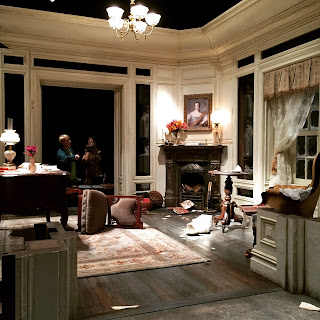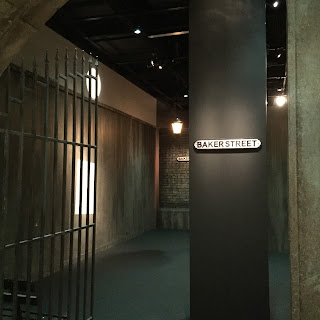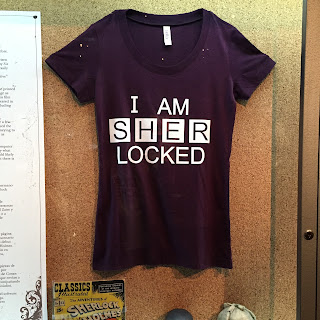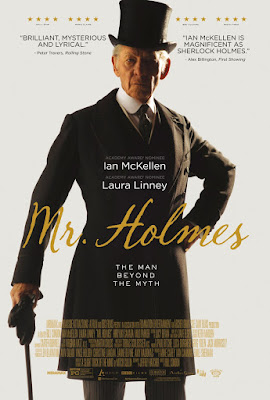 |
| The dogs' Halloween costumes this year. They love this holiday, can you tell? |
Currently reading:
A Kind of Grief by AD Scott: Did I mention this one last week? Anyway, I'm still reading it.
The Conjure Woman by Charles W Chestnutt: A collection of antebellum slave folktales framed by the story of a Northerner trying to start up a vineyard down South. Pretty fascinating actually. Chestnutt's writing style is fantastic.
The Camel Club by David Baldacci: So far it reminds me of Scandal.
Subscription boxes:
This month's Wantable was a study in blue. I feel okay about it. The lace-trimmed cami is very pretty, and the blue cami is okay, although one of the straps is sewn inside out so it twists around. The bra is way more support than I really need, but it fits perfectly.
LOVED this week's Le Tote. I got a cool asymmetrical black top (which you can't really see here, but trust me, it was rad), a badass wine-colored leather jacket, pretty pink blouse, scarf, and a pretty awesome necklace. I think Le Tote's jewelry is much edgier than Rocks Box's, strangely.
And speaking of Rocks Box... more silver jewelry from them. This time it's a pair of bar studs, a Y necklace, and a wrap bracelet. The bracelet kind of bothers my brain; I can't stop messing with it when I wear it. I'm aware this is a personal problem.
This week in heidenkindom:
Busy busy week! Last Sunday we went to a winery called Kingman Estates. Their wines were so unusual and unique, and we got to go on a tour of the winery that was super interesting. This is the type of place that, if I lived closer, I would visit every week.
The next day we went to The International Exhibition of Sherlock Holmes, which I'm sure you can imagine I was suuuuuuper excited about. (Most important decision: which Sherlock Holmes t-shirt to wear.) Anyway, the exhibit was fun, if not terribly informative. There was a mystery to solve and lots of kid-friendly activities to complete (so, perfect for me, then). Not that the exhibit wasn't informed–there were a ton of Easter eggs buried throughout guaranteed to delight devoted Sherlockians. But you wouldn't notice them unless you were already familiar with them and the cannon. The exhibit was mostly about going to the museum and having silly fun than learning about Sherlock, and there's nothing wrong with that.
 |
| Sherlock's study |
 |
| The scene of the crime! |
 |
| The road to Baker Street |
 |
| Do YOU have what it takes to join Scotland Yard? Because I don't. |
 |
| This is the type of Easter egg I'm talking about. If you read my latest post on Book Riot, you not only know who this woman actually is, but who she's supposed to represent. |
 |
| A nice shoutout to Edgar Allan Poe and his Inspector Dupin stories, which were a strong inspiration for Sherlock Holmes. |
 |
| Sherlock in pop culture. |
 |
| My t-shirt's in a museum! |
Now the gift shop on the other hand... as soon as I stepped inside I knew me and all my monies would soon be parted. TONS of awesome books, maps, Sherlock toys, etc. I bought two books and a Sherlock hat and pipe–I obviously wasn't leaving without that–and they also had to-scale copies of the Sherlock Holmes story Conan Doyle wrote by hand for Queen Mary's Doll's House library, "Watson Learns the Trick." This was VERY cool. I didn't buy it because it was $25, but I read it, and the story was super silly.
The rest of the week was spent furiously playing catchup on my writing assignments and helping my parents move into a bigger storage unit. Oh, and trying out St. Germain cocktails. It's the perfect liqueur for fall.
Bonus:
Speaking of St. Germain cocktails, here's one I mixed up that I HIGHLY recommend. I think it's called an Elderflower Fashioned? If not, it should be.
- 2 oz Scotch whiskey (a cheap blend like Grant's works fine, although if you want to use the high end stuff, go on with your bad self)
- 1 oz St. Germaine
- 3 dashes Angostura Bitters
Combine all three ingredients in an old fashioned glass and stir. Then add ice and stir again, until chilled. Add two hefty twists of lemon.
Discus this post with me on Twitter, FaceBook, Google+ or in the comments below.










